many-more与much-more的区别
- 格式:doc
- 大小:26.00 KB
- 文档页数:1
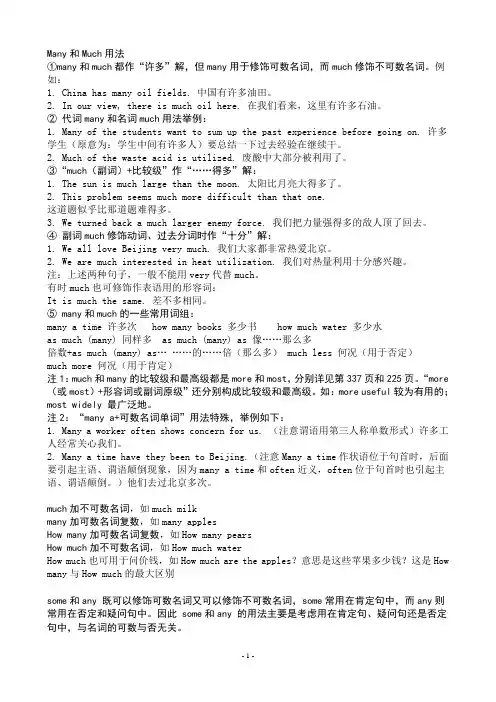
Many和Much用法①many和much都作“许多”解,但many用于修饰可数名词,而much修饰不可数名词。
例如:1. China has many oil fields. 中国有许多油田。
2. In our view, there is much oil here. 在我们看来,这里有许多石油。
②代词many和名词much用法举例:1. Many of the students want to sum up the past experience before going on. 许多学生(原意为:学生中间有许多人)要总结一下过去经验在继续干。
2. Much of the waste acid is utilized. 废酸中大部分被利用了。
③“much(副词)+比较级”作“……得多”解:1. The sun is much large than the moon. 太阳比月亮大得多了。
2. This problem seems much more difficult than that one.这道题似乎比那道题难得多。
3. We turned back a much larger enemy force. 我们把力量强得多的敌人顶了回去。
④副词much修饰动词、过去分词时作“十分”解:1. We all love Beijing very much. 我们大家都非常热爱北京。
2. We are much interested in heat utilization. 我们对热量利用十分感兴趣。
注:上述两种句子,一般不能用very代替much。
有时much也可修饰作表语用的形容词:It is much the same. 差不多相同。
⑤ many和much的一些常用词组:many a time 许多次 how many books 多少书 how much water 多少水as much (many) 同样多 as much (many) as 像……那么多倍数+as much (many) as………的……倍(那么多) much less 何况(用于否定)much more 何况(用于肯定)注1:much和many的比较级和最高级都是more和most,分别详见第337页和225页。
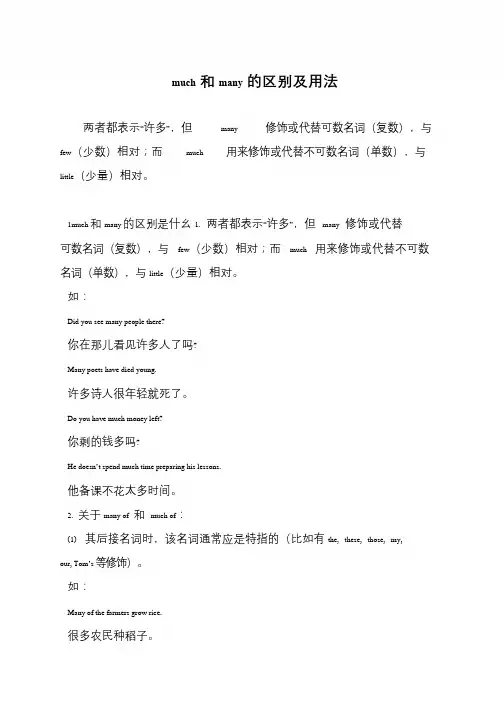
much和many的区别及用法
两者都表示“许多”,但many 修饰或代替可数名词(复数),与few(少数)相对;而much 用来修饰或代替不可数名词(单数),与little(少量)相对。
1much 和many 的区别是什幺1. 两者都表示“许多”,但many 修饰或代替
可数名词(复数),与few(少数)相对;而much 用来修饰或代替不可数名词(单数),与little(少量)相对。
如:
Did you see many people there?
你在那儿看见许多人了吗?
Many poets have died young.
许多诗人很年轻就死了。
Do you have much money left?
你剩的钱多吗?
He doesn’t spend much time preparing his lessons.
他备课不花太多时间。
2. 关于many of 和much of:
(1) 其后接名词时,该名词通常应是特指的(比如有the, these, those, my, our, Tom’s等修饰)。
如:
Many of the farmers grow rice.
很多农民种稻子。


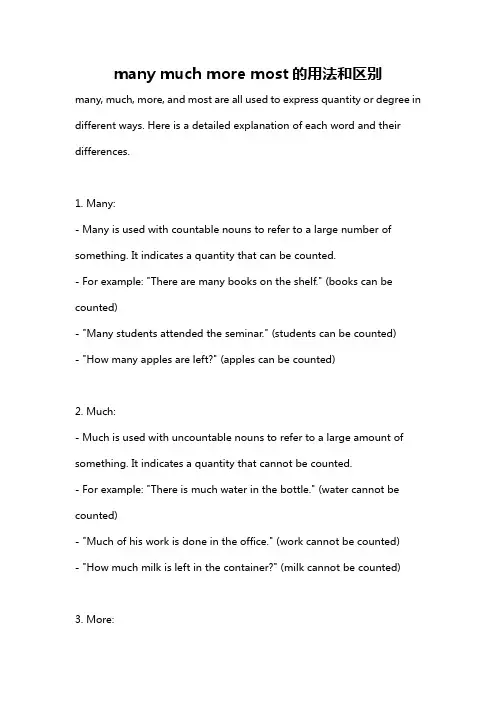
many much more most的用法和区别many, much, more, and most are all used to express quantity or degree in different ways. Here is a detailed explanation of each word and their differences.1. Many:- Many is used with countable nouns to refer to a large number of something. It indicates a quantity that can be counted.- For example: "There are many books on the shelf." (books can be counted)- "Many students attended the seminar." (students can be counted)- "How many apples are left?" (apples can be counted)2. Much:- Much is used with uncountable nouns to refer to a large amount of something. It indicates a quantity that cannot be counted.- For example: "There is much water in the bottle." (water cannot be counted)- "Much of his work is done in the office." (work cannot be counted)- "How much milk is left in the container?" (milk cannot be counted)3. More:- More is used to compare two quantities or degrees. It indicates an increase or addition to what already exists.- For example: "She wants more candy than her sister." (comparing quantities of candy)- "He earns more money than his coworkers." (comparing amounts of money)- "We need more time to finish the project." (referring to an additional amount of time)4. Most:- Most is used to refer to the highest degree or quantity of something. It indicates a large majority or the greatest extent.- For example: "Most people prefer chocolate over vanilla." (referring to the majority of people)- "He is the most talented athlete on the team." (referring to the highest degree of talent)- "She spends most of her time studying." (referring to the greatest extent of time)Now let's compare the differences between these words in more detail:1. Countable vs. Uncountable:- Many is used with countable nouns, while much is used with uncountable nouns.- Countable nouns are things that can be counted individually, such as books, students, or apples.- Uncountable nouns are things that cannot be counted individually, such as water, work, or milk.2. Quantity vs. Degree:- Many and much are used to indicate quantity or amount, while more and most are used to indicate a higher degree or additional quantity.- Many and much focus on the specific number or amount, while more and most focus on comparing or increasing what already exists.3. Comparative vs. Superlative:- More is used to compare two quantities or degrees, while most is used to refer to the greatest extent or highest degree.- More is used when comparing two things, while most is used when there are more than two things and one stands out as the highest or greatest.4. Context and Usage:- Many and much are more commonly used in affirmative statements,questions, and negative statements.- More and most are used in comparative statements, superlative statements, and to show an increase or addition.In conclusion, many, much, more, and most are used to express quantity or degree in different ways. Many is used with countable nouns, much is used with uncountable nouns, more is used to compare, and most is used to refer to the highest degree or majority. The choice of word depends on the noun being used, the context, and the intended meaning.。
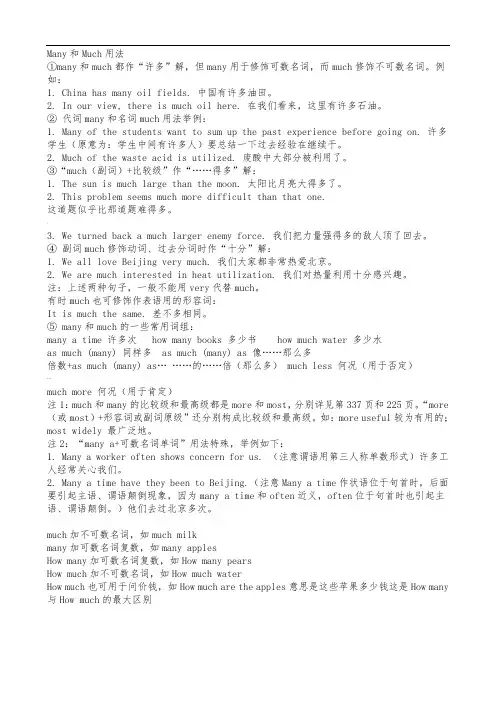
Many和Much用法①many和much都作“许多”解,但many用于修饰可数名词,而much修饰不可数名词。
例如:1. China has many oil fields. 中国有许多油田。
2. In our view, there is much oil here. 在我们看来,这里有许多石油。
②代词many和名词much用法举例:1. Many of the students want to sum up the past experience before going on. 许多学生(原意为:学生中间有许多人)要总结一下过去经验在继续干。
2. Much of the waste acid is utilized. 废酸中大部分被利用了。
③“much(副词)+比较级”作“……得多”解:1. The sun is much large than the moon. 太阳比月亮大得多了。
2. This problem seems much more difficult than that one.这道题似乎比那道题难得多。
:3. We turned back a much larger enemy force. 我们把力量强得多的敌人顶了回去。
④副词much修饰动词、过去分词时作“十分”解:1. We all love Beijing very much. 我们大家都非常热爱北京。
2. We are much interested in heat utilization. 我们对热量利用十分感兴趣。
注:上述两种句子,一般不能用very代替much。
有时much也可修饰作表语用的形容词:It is much the same. 差不多相同。
⑤ many和much的一些常用词组:many a time 许多次 how many books 多少书 how much water 多少水as much (many) 同样多 as much (many) as 像……那么多倍数+as much (many) as………的……倍(那么多) much less 何况(用于否定)…much more 何况(用于肯定)注1:much和many的比较级和最高级都是more和most,分别详见第337页和225页。
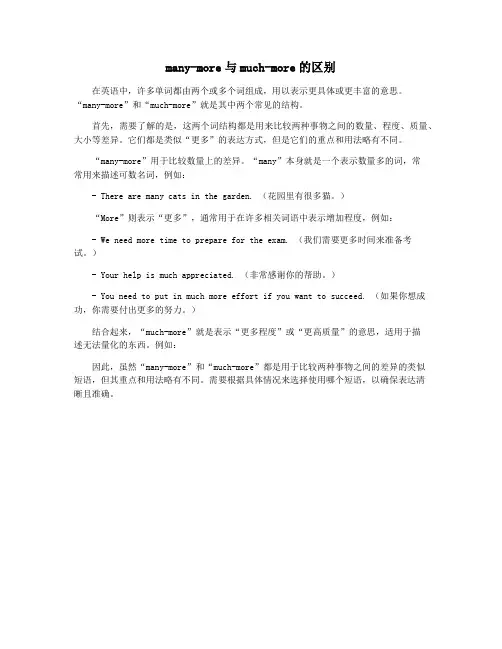
many-more与much-more的区别
在英语中,许多单词都由两个或多个词组成,用以表示更具体或更丰富的意思。
“many-more”和“much-more”就是其中两个常见的结构。
首先,需要了解的是,这两个词结构都是用来比较两种事物之间的数量、程度、质量、大小等差异。
它们都是类似“更多”的表达方式,但是它们的重点和用法略有不同。
“many-more”用于比较数量上的差异。
“many”本身就是一个表示数量多的词,常
常用来描述可数名词,例如:
- There are many cats in the garden. (花园里有很多猫。
)
“More”则表示“更多”,通常用于在许多相关词语中表示增加程度,例如:
- We need more time to prepare for the exam. (我们需要更多时间来准备考试。
)
- Your help is much appreciated. (非常感谢你的帮助。
)
- You need to put in much more effort if you want to succeed. (如果你想成功,你需要付出更多的努力。
)
结合起来,“much-more”就是表示“更多程度”或“更高质量”的意思,适用于描
述无法量化的东西。
例如:
因此,虽然“many-more”和“much-more”都是用于比较两种事物之间的差异的类似
短语,但其重点和用法略有不同。
需要根据具体情况来选择使用哪个短语,以确保表达清
晰且准确。
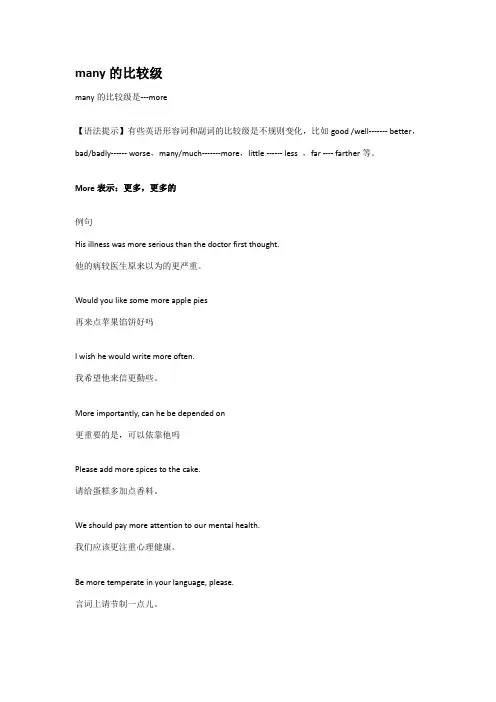
many的比较级many的比较级是---more【语法提示】有些英语形容词和副词的比较级是不规则变化,比如good /well------- better,bad/badly------ worse,many/much-------more,little ------ less ,far ---- farther等。
More表示:更多,更多的例句His illness was more serious than the doctor first thought.他的病较医生原来以为的更严重。
Would you like some more apple pies再来点苹果馅饼好吗I wish he would write more often.我希望他来信更勤些。
More importantly, can he be depended on更重要的是,可以依靠他吗Please add more spices to the cake.请给蛋糕多加点香料。
We should pay more attention to our mental health.我们应该更注重心理健康。
Be more temperate in your language, please.言词上请节制一点儿。
Life is getting more complex and difficult.生活正在变得越来越复杂和艰难。
You'll like it better when you understand it more. 当你对它更了解时,你就会更喜欢它。
The doctor advised him to take more exercise.医生建议他多运动。
Real friendship is more valuable than money.真正的友谊比金钱更宝贵。

many more与much more用法小议语言知识哼一,曩谈5两竞manymore与muchmore用法小议吉林省长岭三中王君徐亚静manymore与muchmore均可译作"另外很多"或"比……多很多".那么二者在用法上有什么差异呢?本文试就这一问题作一归纳分析.1.manymore与muchmore都可以用作名词词组.many和much都是形容词,分别修饰名词more.manymore表示可数概念,含义为"另外很多";muchmore用来表示不可数概念,意为"另外很多"或"大得多".如:1)Insteadoffeweraccidentstherearemanymore.事故非但没有减少,反而增加了许多.2)Thereasonwhywintersunlightiscooleristhatthesun'SrayscometoUSatmuchmoreofaslant.冬天的阳光之所以弱一些,是因为冬天太阳的光线照到我们地球上的倾斜度比夏天要大得多.(注:此处muchmore指的是slant的程度,是不可数概念)2.manymore和muchmore都可以看作形容词词组,修饰名词.manymore修饰可数名词,muchmore修饰不可数名词;二者都是"另有很多","许多"之意.如:1)Therearemanymorevisitorsthanusua1.游客比平常多得多.!)IiiLLCCL一lf!})Ilsi:I,}j:一-I:,.}tfl:tI1uchmoremoney赚得更多的钱.他在生意上的成功,使他3.manymore和muchmore都可以用于比较状语从句,但两者各自的句子结构不同,因而用法各异.现分述如下:1)manymore构成的句式是"manymore+可数名词+than从句",意思是"比……多得多".此处more是many的比较级,它前面的many起加强语气作用,修饰more.如:①Thefoodshehaspreparedforthe partyisnotenough,fortherearemanymore peoplethansheexpected.她为这次聚会准备的食物不够,因为参加聚会的人数远比她预料的要多得多.②Ittakesmanymorehourstogoby trainfromBeijingtoNanjingthantoTianjin.从北京坐火车到南京比到天津要多花好几个小时.2)muchmore构成的句式一般有两种情况:A."muchmore+不可数名词+than从句",意思是"比……大得多".这里more是much的比较级,它前面的much起加强语气的作用,修饰more.如:Mybrotherhasmademuchmorepro—gressthistermthanhedidlastterm.我弟弟这学期进步比上学期要大得多. B."muchmore+形容词(或副词)原级十than从句",意思是"比……更'',这里more +形容词(或副词)构成比较级,much起加强语气的作用,修饰比较级.如:①Theboyismuchmorediligentthanthat.这个男孩比那个男孩用功得多.}itdrivesIIluchmorecarefullythan hedidthreeyearsago.他开车比三年前谨慎得多了.2004.7.总169?62?4.muchmore还可以用来表示"更加,何况". 而manymore则不能表示此意.例如: Wecanmakesatellites,muchmoreplanes.我们会造卫星,更不用说造飞机了.。
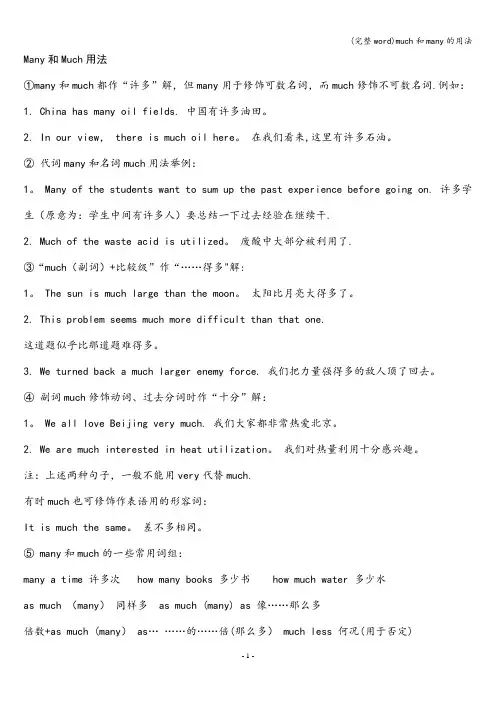
Many和Much用法①many和much都作“许多”解,但many用于修饰可数名词,而much修饰不可数名词.例如:1. China has many oil fields. 中国有许多油田。
2. In our view, there is much oil here。
在我们看来,这里有许多石油。
②代词many和名词much用法举例:1。
Many of the students want to sum up the past experience before going on. 许多学生(原意为:学生中间有许多人)要总结一下过去经验在继续干.2. Much of the waste acid is utilized。
废酸中大部分被利用了.③“much(副词)+比较级”作“……得多"解:1。
The sun is much large than the moon。
太阳比月亮大得多了。
2. This problem seems much more difficult than that one.这道题似乎比那道题难得多。
3. We turned back a much larger enemy force. 我们把力量强得多的敌人顶了回去。
④副词much修饰动词、过去分词时作“十分”解:1。
We all love Beijing very much. 我们大家都非常热爱北京。
2. We are much interested in heat utilization。
我们对热量利用十分感兴趣。
注:上述两种句子,一般不能用very代替much.有时much也可修饰作表语用的形容词:It is much the same。
差不多相同。
⑤ many和much的一些常用词组:many a time 许多次 how many books 多少书 how much water 多少水as much (many)同样多 as much (many) as 像……那么多倍数+as much (many) as………的……倍(那么多) much less 何况(用于否定)much more 何况(用于肯定)注1:much和many的比较级和最高级都是more和most,分别详见第337页和225页。
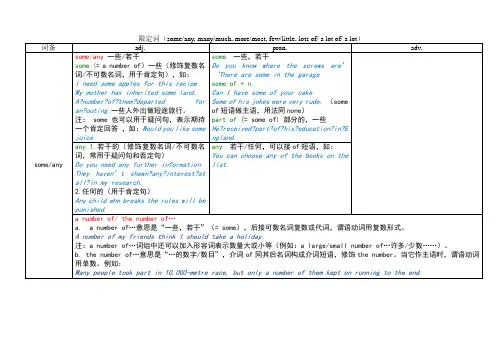
Unit5 形容词考点一:形容词的句法作用形容词在句中主要可以用作定语、表语、宾语补足语和状语。
考点二:多个形容词的排列顺序形容词作定语通常放在所修饰的名词前,若有几个形容词,一般则按照以下顺序排列:限定词→数词→描绘词(大小,长短,形状,新旧,颜色)→出处(国籍,产地)→材料→用途→名词a small round table 一张小圆桌子a dirty old red skirt 一条脏的旧红裙子a fine little old stone bridge 一座漂亮的古老小石桥ten large black plastic bags 十只黑色的大塑料袋the first Chinese astronaut 第一个中国宇航员such a pretty little wooden garden chair 这么漂亮的花园用的小木椅子考点四:形容词的比较级和最高级形容词有三个等级:原级、比较级和最高级,统称为“比较等级”。
1. 形容词比较级和最高级的构成(1)规则形式单音节形容词和少数双音节形容词是在原级后加-er,-est构成,多音节和其他双音节词是在词前加more, most构成。
构成方式见下表:注意:1)glad, fond, tired, pleased, shy等单音节词,常在词前加more和most构成比较级和最高级,如:more glad / pleased; most glad / pleased。
2)less和least也可用来构成比较等级,表示“较不…”和“最不…”,如less dangerous(较不危险的),least dangerous(最不危险的)。
(2)不规则形式英语里有些形容词的比较级和最高级是不规则的,需要逐个记忆,详见下表:注:1)few常用规则的比较等级fewer和fewest,但在当代英语里也可以用less和least。
2) elder和eldest在英国英语里表示年长关系,而美国英语却用older 和oldest。
Many和Much用法①many和much都作“许多”解,但many用于修饰可数名词,而much修饰不可数名词。
例如:1. China has many oil fields.中国有许多油田。
2. In our view, there is much oil here.在我们看来,这里有许多石油。
②代词many和名词much用法举例:1. Many of the students want to sum up the past experience before going on.许多学生(原意为:学生中间有许多人)要总结一下过去经验在继续干。
2. Much of the waste acid is utilized.废酸中大部分被利用了。
③“much(副词)+比较级”作“……得多”解:1. The sun is much large than the moon.太阳比月亮大得多了。
2. This problem seems much more difficult than that one.这道题似乎比那道题难得多。
3. We turned back a much larger enemy force.我们把力量强得多的敌人顶了回去。
④副词much修饰动词、过去分词时作“十分”解:1. We all love Beijing very much.我们大家都非常热爱北京。
2. We are much interested in heat utilization.我们对热量利用十分感兴趣。
注:上述两种句子,一般不能用very代替much。
有时much也可修饰作表语用的形容词:It is much the same.差不多相同。
⑤many和much的一些常用词组:many a time许多次how many books多少书how much water多少水as much (many)同样多as much (many) as像……那么多倍数+as much (many) as………的……倍(那么多)much less何况(用于否定)much more何况(用于肯定)注1:much和many的比较级和最高级都是more和most,分别详见第337页和225页。
much和more的用法much是用来修饰比较级的,much more beautifulmore是用来构成比较级的,more beautiful有much more than这种用法吗?不是more than而是much more than在英语中,这种用法是有的,因为much后边要加形容词的比较级,more than是比较级句式,所以就能加哦!还有,如果more后边有像beautiful,careful一类很长的词,这个用法也对!加油!many , most ,much , more的意思和用法many+可数复数名词,表“很多……”most+形容词,表“最……”much+不可数名词,表“很多……”more+形容词,名词,表“更,更多……”more 和much 的区别和关于这两个词的用法,详细解释,不要太长,要精华就可以,最好有举例A more 是much和many的比较级既可以修饰可数名词也可以修饰不可数名词而much仅仅是修饰不可数名词表示很多,也可以做程度讲解.其实这两个词很简单的B much和very连用至于句尾当副词用而more不可C 在more做比较级修饰形容词的时候much可以用来修饰more 例如英语中more,much和much more的区别与用法more是指较多,用于比较级much是指很多,用于不可数名词much more是指较多(更进一步),也用于比较级more--可数不可数都行much--只修饰不可数或比较级much more--只修饰形容词或副词,不能修饰名词关于many more 和much more用much修饰more只是一种用法。
如果不是一定把它们都当成固定词组,而可以是单词的组合的话,它们的用法有区别。
many more本身不是一个整体。
比如“many more people”就是很多其他的人、更多的人这种意思。
它的后面加上可数名词复数,实际上是这样一种用法:more可以置于数词或者any,some,no,a few,a little,many,much的后面,表示另外的、附加的、超过的。
more most的用法区别一、更多与最多的用法区别"更多"和"最多"是英语中常见的词汇,它们都可以表示数量或程度上的增加。
尽管这两个词经常被混淆使用,但它们在意义和用法上有着明显的区别。
一、意义区别1. 更多:指超过原有数量或程度,并且可以继续增加。
它强调了一个相对较大的范围。
2. 最多:指在所有可能选项中数量或程度最大的那个。
它表示达到极限,不再有更大的可能性。
二、用法区别1. 修饰可数名词时:- 更多:当我们想表达一个比已知数量更大的额外的数量时,我们使用"更多"。
例如:I need to buy more apples for the party.- 最多:当我们想表达从若干选项中选择出具有最高数字或程度的数量时,我们使用"最多"。
例如:John has the most cars among all of his friends.2. 修饰不可数名词时:- 更多:当我们想表达一个比已知数量或程度更大或进一步扩展范围时,我们使用"更多"。
例如:Can you give me more information about this topic?- 最多:当我们想表达某一事物的最高限度或数量时,我们使用"最多"。
例如:He has the most money among all his siblings.3. 在比较级和最高级结构中:- 更多:常与"than"连用,在表示不同的程度、数量或质量时,与其他人或物进行比较。
例如:She is more intelligent than her classmates.- 最多:常跟在名词前面,并且用来表示在某个范围或选项内数量或程度的最大值。
例如:This is the most delicious cake I have ever tasted.4. 在疑问句和否定句中:- 更多:当我们向别人询问某一事物的额外数量或度量时,我们使用更多。
many more和much more的用法Manymore和muchmore是英语中两个有着不同特点的副词组合,它们拥有独特的用法,有助于更准确地表达意思。
在英文口语和书面语中,many more和much more都是常用的修饰语,它们的区别更加明显在增加的补充性意义以及表达的方式上。
首先,many more和much more不同点在于它们有不同的补充性意义。
many more指许多其他的东西,表示已知可以指定更多东西,但没有确切的数量。
相比之下,much more表示更多的东西,暗示有更多的可能性。
例如,一位作者可能会写:“我发现他的困难比我想象的更多。
”这里的“更多”暗示着可能性的增加......比如有更多的问题或挑战。
另一个不同之处是many more和much more的表达形式。
many more建议已知的许多可以指定的事物,而不是一个总量的可能性。
因此,它只能与可数名词一起使用。
例如,一位教师可能会说:“我有很多门课程要教,比如英语,历史,化学和许多其他课程。
”另一方面,much more指更多的可能性,而不是已知的可数名词,因此它可以与不可数名词一起使用。
例如,科学家可能会说“这种发现可能会带来更多的研究机会。
”此外,many more和much more也有用法上的不同。
many more 通常用作状语或定语,但可以用作副词。
例如,一个人可能会说:“我必须做很多事情,比如学习,工作,拜访朋友,参加兴趣小组以及更多的事情。
”但是,much more通常只用作副词,因为它表示更多可能性,而不是可以指定的数量。
此,一个人可能会说:“我知道这需要更多的努力。
”总之,many more和much more是英语中两个不同的副词组合,它们的用法不同,有不同的补充性意义。
many more指已知的许多可指定的东西,而much more指更多的可能性。
此外,many more通常用作状语或定语,但也可以用作副词,而much more通常只用作副词。
Many和Much的用法区别(最新版)编制人:__________________审核人:__________________审批人:__________________编制单位:__________________编制时间:____年____月____日序言下载提示:该文档是本店铺精心编制而成的,希望大家下载后,能够帮助大家解决实际问题。
文档下载后可定制修改,请根据实际需要进行调整和使用,谢谢!并且,本店铺为大家提供各种类型的经典范文,如词性大全、句法大全、句型大全、从句大全、时态大全、语态大全、语法大全、虚拟语气、用法辨析、其他资料等等,想了解不同范文格式和写法,敬请关注!Download tips: This document is carefully compiled by this editor.I hope that after you download it, it can help you solve practical problems. The document can be customized and modified after downloading, please adjust and use it according to actual needs, thank you!In addition, this shop provides you with various types of classic sample essays, such as part of speech, syntax, sentence pattern, clause, tense, voice, grammar, subjunctive, usage analysis, other materials, etc. If you want to know the different formats and writing methods of the model essay, please pay attention!Many和Much的用法区别1. 两者都表示“许多”,但 many 修饰或代替可数名词(复数),与 few(少数)相对;而 much 用来修饰或代替不可数名词(单数),与little(少量)相对。
many more与much more的区别
[1]
much修饰more只是一种用法。
如果不是一定把它们都当成固定词组,而可以是单词的组合的话,它们的用法有区别。
many more本身不是一个整体。
比如“many more people”就是很多其他的人、更多的人这种意思。
它的后面加上可数名词复数,实际上是这样一种用法:more可以置于数词或者any,some,no,a few,a little,many,much的后面,表示另外的、附加的、超过的。
much more的意思比较丰富,它后面加的是不可数名词。
除了与many more 一样也有上述用法外,它还可以作为比较级。
这时,more就是一个简单的比较级的形容词,而much是修饰比较级的副词,相同用法还有eg.much bigger,much hotter等,语法结构相同。
和much一样具有修饰比较级作用的还有rather,even,a little等等。
同时,more不仅可以单独作为比较级,而且还可以和形容词一起构成比较级,这时的much就是修饰整个比较级而不是单纯修饰much的了。
如much more beautiful。
但是不用把它想的太复杂,它和more直接作比较级时语法相同,只不过much后面的比较级长了一点而已。
[2]
many more后接一个名词一定是个复数可数名词。
若不接名词,则more
本身就被看作是一个复数名词,表示复数概念。
eg.:
①Some students are against the plan, but many more support it. 一些同学反对这项计划,但是有更多人支持它。
②We have many more left. 我们还剩下很多。
much more后接一个名词,这个名词一定是个不可数名词。
若不接名词,则more本身就被看作是一个不可数名词。
如:
①The farmers have produced much more rice. 这些农夫收了更多的稻谷。
②She has much more to do. 她还有很多事要去做。
many more不可能修饰形容词和副词,而much more和far more, even more, still more 等一样,可以修饰形容词和副词,表示“更加”。
eg.
①This TV set is much more expensive. 这台电视机要贵得多。
②He worked much more carefully on the new design. 在这项新的设计上,他工作努力得多了。